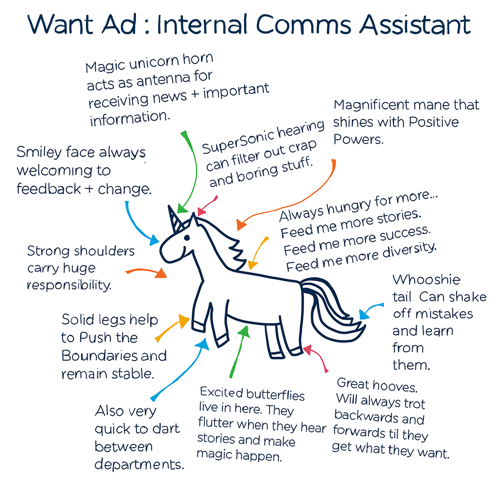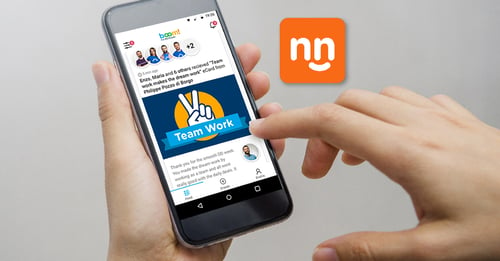.jpg?width=600&name=shutterstock_212665924%20(1).jpg)
5 min read
With so many of us kicking off a new fiscal year soon, it's a good time to think about your people team goals for the days, months and years ahead. And core to that, at least in the HR world, is continuously updating important documentation and processes for our people.
Seek out the parts of your people strategy that need a refresh and are most relevant to your business in order to enhance your Employee Value Proposition (EVP), improve how you talk about your business and improve how you communicate with your people.
To get you started, we’ve outlined the six elements of your people strategy worth a refresh:
| 1. Careers page |
| 2. Employee Handbook |
| 3. Job adverts |
| 4. Diversity statement |
| 5. Pay review process |
| 6. Company news and updates |
1. Updating your careers page
Your careers page is likely the first interaction your candidates will have with your employer brand and with your organisation. You want potential employees to get excited about the thought of joining your organisation, right? If your careers page is outdated, start by adding fresh images of real people who work at your company – because stock photos are so last year.
And if you have multiple office locations, make sure you outline that on your careers page with images so people know what to expect when they come in for an interview. For example, on Reward Gateway’s Boston office page, you can take a virtual tour of our office space. Be sure to include a little bit about your interview process, the benefits you offer and testimonials from your current employees.

2. Employee Handbook
Do you have an Employee Handbook? If yes, it might be time to take another look at it with fresh eyes and see where you can improve. Is your parental leave policy the best it can be? When’s the last time you refreshed your severance policy?
And if you don’t have an Employee Handbook, it’s not too late to start working on one and make that one of your 2019 people goals. In fact, I’ve been working on our own Employee Handbook with the People Team at Reward Gateway.
Our people are our most important asset. While we need to make sure they understand our policies, our role as HR professionals is to continuously re-evaluate those policies.
Download our eBook to discover the new era of workplace communication to improve your people strategy »
3. Job Advertisements
Writing job advertisements has changed in the past few years. Why? Because people are looking for creative and forward-thinking companies. Meaning, black and white job descriptions that don’t truly tell a person how they’ll fit into the organisation aren't going to cut it.
People are looking to join an organisation that aligns with their personal and professional goals.
A little while ago, I wrote a job advertisement using a unicorn reference. If you don’t know by now, I love unicorns! But that’s not the only reason I did this. In one of my previous posts, I outline how to attract top talent with creative job advertisements, and the lessons I learned along the way – like not being afraid to redesign your job ad.
Below is what the unicorn job advertisement looked like. Instantly, a candidate could know if this was or wasn’t the job for them – which helps both sides in the long run.

4. Diversity Statement
Each year, we craft our Diversity Statement – a key way to demonstrate our continuous effort towards building a more inclusive and diverse workplace. Having a diversity statement in place lets your employees know that you respect them as individuals and that you are an open and honest business.
Employees are more likely to trust your organisation when they have insight into what the company’s goals and focusses are for the year ahead.
5. Pay review process
In August 2017, we took a hard look at our pay review process and decided it was time to make a change. Pay reviews can be an emotive time, so the goal was to make the process as clear and straightforward as possible with helpful employee communications (using blog posts, updates and videos) throughout.
Think about your own organisation – could you be improving the pay review process for employees? Some options include creating a pay review guide or publishing your pay philosophy, which in turn can improve your company culture and build better connections with employees with open and honest communication on a tough subject.
6. Company news
How do your employees stay up-to-date with all of the changes and information the organisation produces? Email is a great tool, but with the average person receiving on average 126 business emails per day in 2019, it can be hard for employees to keep track of all of the messages in their inboxes.
How can you refresh your company news and updates? For starters, try new ways of communicating with your employees. Mobile is where it’s at, so make sure your communications (and engagement initiatives) are available on all devices, especially for on-the-go or deskless employees.

One way we do this is with our employee engagement platform. Employees receive company news in their inbox, in designated Slack channels through our platform integrations, on our employee engagement app and can read it directly in the platform on any device, at any time.
Keeping company news and updates at your employees’ fingertips is key to strengthening employees’ connection to your purpose, mission and values.
I recommend tackling these six elements one at a time, as you’ll want to give them your undivided attention and have a finish product you’re proud to share with employees. Make 2019 the year that you practice open and honest communications with your employees and improve your people strategy.
Tell me in the comments below, which of the six people strategy elements do you plan on updating first?

 Catrin Lewis
Catrin Lewis




